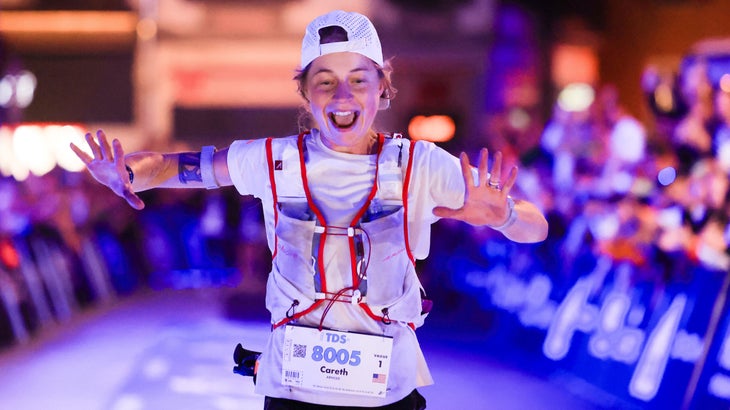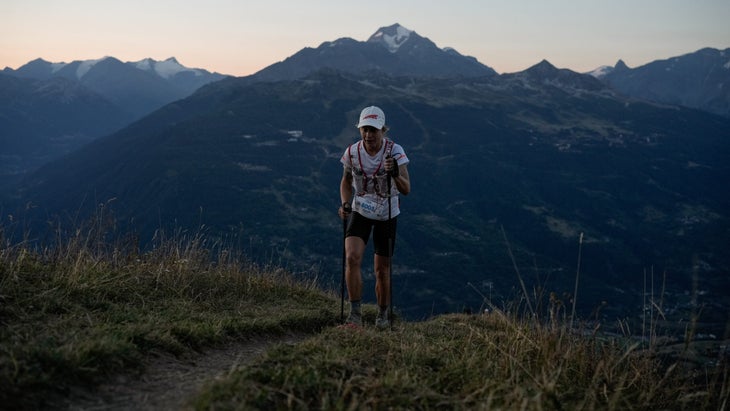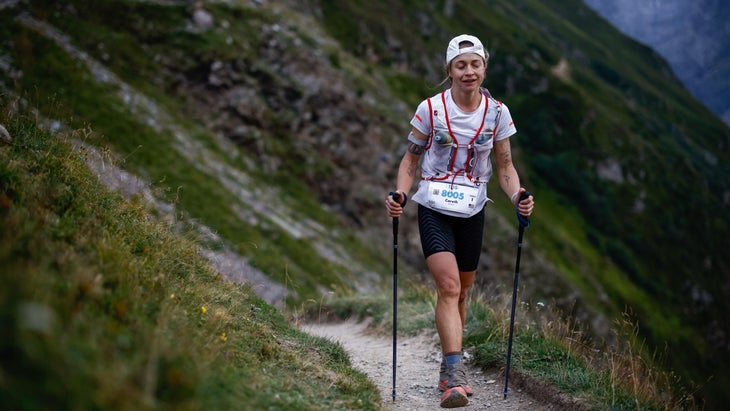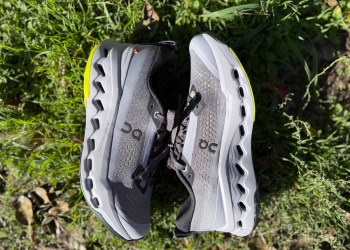The mother of two is the first American to win the burly 95-mile race during UTMB week.
(Photo: Jacob Zocherman)
Updated August 28, 2025 12:00PM
Americans have won pretty much every race during UTMB week many times over, including double-digit wins at the crown jewel, UTMB. But for the 13 years it’s been around, TDS—the highly-technical, 95-mile “cool kids” race at the beginning of the week—has been a white whale for the U.S. Until now, thanks to Careth Arnold.
Late on Tuesday night, Arnold won TDS in 22 hours, 58 minutes, and 52 seconds, a staggering 85 minutes up on second-place Hélène Dassy (Belgium).
The 35-year-old mom of two who recently moved with her family to Paiona, Colorado, executed TDS to pretty much perfection. It’s her first time in Chamonix, and in fact her first time in France.
“I like to climb and I like to descend,” she answered simply when we asked her how she cracked the code.
That feels like an oversimplification, or really, an understatement. Don’t let her affability fool you—this is a runner who knows how to suffer, even relishes it. She gave birth to her daughters, five and two, at home with no medication because she wanted to “come to terms with the pain.” She also cited motherhood as one of the key reasons she was able to successfully navigate the sleep deprivation that came with jet lag, starting the race at midnight, and not finishing until nearly midnight the next day.
Arnold yo-yoed with Ida Sophie Hegemann (Germany) and Manon Bohard Cailler (France) during the early kilometers. But ultimately, no one could keep up with her punishing pace. She shook her competition for good around 50K, despite losing her quads around then, and just kept hammering to the end.
We caught up with Arnold on Wednesday to try and understand how she cracked the code to European championship racing on the first try.

Outside Run: How are you feeling?
Careth Arnold: Pretty good. I’m loving being here. It’s amazing.
No American has ever won this race before. And you come over here and hit the ball out of the park on the first try. How did you do it?
I like to climb and I like to descend. There’s lots of that.
Can you walk us through your race a little bit?
It’s really just steep ups and steep downs. It’s beautiful. You just traverse a variety of different hills and mountains. And, yeah, I’m just so impressed with how many kilometers you can go up before you go down. It’s really amazing. And it was pretty technical for the most part, especially in the back half a lot of rude rocks. And I like technical terrain. It just keeps it exciting.
How did you train for a race like this in the U.S.? The climbs are so much longer here than anything we have over in America.
I live in Colorado, and in my backyard, I have a mountain that goes up to about 11,200 feet. It’s not heavily trafficked, so I can get up there pretty fast. I live at about 6,000 feet, and the trail is pretty overgrown and technical, because nobody really climbs it. So I just do my long runs up and down that.
The race starts at 11:50 p.m. You were already a bit sleep-deprived coming over here just two days before the race. How did you deal with the sleep deprivation out there?
I’m a mother. Mothers are good at sleep deprivation.
Explain more.
Yeah, we just learn to function when we don’t have a choice. And then, of course, we love our sleep. And in that back 50K of the race, I remember really feeling tired, but you just have to make do with what you got. I didn’t have much time to adjust.
Were you taking in caffeine, lots of sugar? What was your strategy?
I did do some caffeine, which is helpful, but after a while, I didn’t even feel the effects of it anymore. I had just passed that point where my body was just too tired.
What did you say to yourself when you were exhausted going up and down these huge mountains?
I can do this. This is fun.
You are one tough lady, as we’re quickly learning. You have two adorable daughters, and you gave birth to them, both at home, with no medication. Explain to us how those experiences are useful in ultras.
I like to feel my pain, for good reasons, you know. I find that when you can go through moments of suffering, the end is always so much more beautiful. I felt like if I could really experience childbirth, then I’d really just find the euphoria out of it. And the same with ultra running; you could go through so much suffering and pain when we’re out there, but then there’s so much joy that comes at the end of that.

That’s so beautiful. What were the hardest moments out there?
Um, when my quads blew out.
When was that?
That was like, around the 50K mark. It was painful. So all my descents, and I love descending, became very excruciating, all the way until the finish.
How did you get through that with no quads?
I just, you know, I just bore down. I just kept telling myself that the body is amazing. You know, it’s always so much more capable than what we think it is. So I kind of just keep telling myself, “Your body can do this. Your body can do this.”
Another testament to just how tough you are is you were second at a very hard, mountainous, 100-mile race, the High Lonesome 100 in Colorado, just five weeks ago. How did you turn this around so quickly? What are your recovery secrets?
I find that the more we do hard things, the more the body adapts. So I feel like the more I race, the more my body adapts to recovery and begins to understand, “Okay, this is normal. This is what we do.” So I recover very quickly, especially being a mom where I don’t get much rest or sleep, but I tend to just recover quickly. It’s pretty amazing.
Wow. I love how you turn what most people consider challenges into opportunities.
Yeah, I mean, it just makes life more enjoyable.
Can you talk a little bit about the difference between American ultra running and European ultra running?
Yeah, I’m just so impressed by how much bigger fans they are here; they love trail running. It’s amazing. Everybody I passed yesterday was so encouraging, so enthusiastic. There’s so much passion. And I feel like there’s just so much compassion here, and that’s really contagious.

Were you fueling off of that during the race?
It helped, especially when I was low. I’d have some people even run alongside me for 100 meters or so, just encouraging me, and for those reasons, I’m like, I can’t quit, there’s too much encouragement.
Because you moved into the lead quite early on.
Yeah, we were kind of leapfrogging, and I kind of took the lead after Bourg Saint Maurice (50.9K). Yeah, that climb, I was feeling that climb, like I’m about this climb. This climb feels great. And I just went up.
You grew up in Thailand. Did growing up internationally help you at all? Just flinging yourself over here and dropping into France and doing this race.
Definitely. I traveled a lot with my family as a kid, too, so I could easily adapt. I’m very adaptable.
You have a bunch of races coming up, right?
I have one in nine days. It’s pretty vicious. I don’t know how the turnaround will be. It’s a 100K in West Virginia. And then I have the Javelina Jundred at the end of October.














